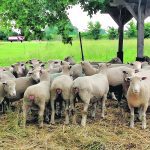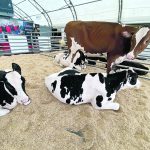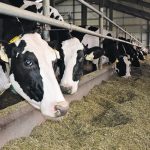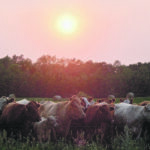Tag Archives genetics

Genetics and management help herd efficiency

Colombia opens door to small ruminant exports
Frozen semen can now be exported to the South American country from flocks not participating in the scrapie program
Canadian sheep and goat farmers now have more access to export markets with a recent approval to ship frozen semen to Colombia without the need for scrapie risk certification. That’s in addition to the agreement two years ago that allowed embryos and live small ruminants access to Colombia. Live animals and embryos have to come […] Read more
Farmers urged to make tough genomic choices
Emotions often play a role when deciding which heifers to keep, but producers agree that genetics cannot be overlooked
At Rose Vega Farm near Cambridge, Ont., Luke and Kelly Donkers agree that emotion sometimes creeps into dairy breeding decisions. “There are probably more grey-haired cows on our farm than just about anybody else,” Kelly joked as the Donkers took part in a genomics exercise held at EastGen’s display at the Dairy Innovation Centre at […] Read more
Genetics may answer methane riddle
Researchers plan to search for genetic traits that can help producers reduce greenhouse emissions in the dairy industry
A dairy industry group plans to study methane emissions to find genetic traits in cattle that will reduce greenhouse gases while not cutting production. Lactanet Canada is expected to launch its methane efficiency program in April, adding the genetic trait to its portfolio in evaluating Holstein dairy cattle. Brian Van Doormaal, chief services officer with […] Read more
Genetics, feed help build top cows
Nutritional developments in the beef sector have evolved in step with producers’ genetic and mating decisions
Cows and race cars have something in common — their build and their inputs are part of a winning formula and optimum performance. “Making modifications to your car is like making genetic improvements to your cow. Make sure you are also putting in the right kind of fuel (nutrition),” said Kajal Devani, director of breed […] Read more
The problems of plenty

New varieties rescue wheat crop
Much has been said about soil moisture reserves, but better genetics also saved crop yields from drought this year
Somewhere between $300 and $325 million — that’s how much the latest spring wheat varieties with superior water use efficiency may have added to Saskatchewan’s production this year. Farmers in many parts of Saskatchewan have been surprised this year by their crop yields, including spring wheat yields, because soil conditions have been exceptionally dry for […] Read moreResearchers building new stem rust resistance
Gene discoveries | Canadian officials working to stack resistant genes to guard crops against Ug99 stem rust
The discovery of three wheat genes that are resistant to Ug99 stem rust will help the Canadian wheat industry stay a step ahead of the devastating wheat disease. Canadian researchers, led by Agriculture Canada wheat pathologist Tom Fetch, have identified three previously undescribed wheat genes that are resistant to Ug99. Ug99 is a deadly race […] Read more



